Key takeaways:
- E-reading solutions enhance the reading experience with portability, customization options, and features that aid comprehension.
- Curating research is vital for distilling complex information, fostering informed discussions, and stimulating innovative ideas.
- Utilizing reliable online resources, evaluating author credentials, and checking citations help ensure information credibility.
- Effective research organization techniques, like thematic folders and regular system updates, enhance clarity and focus in research efforts.
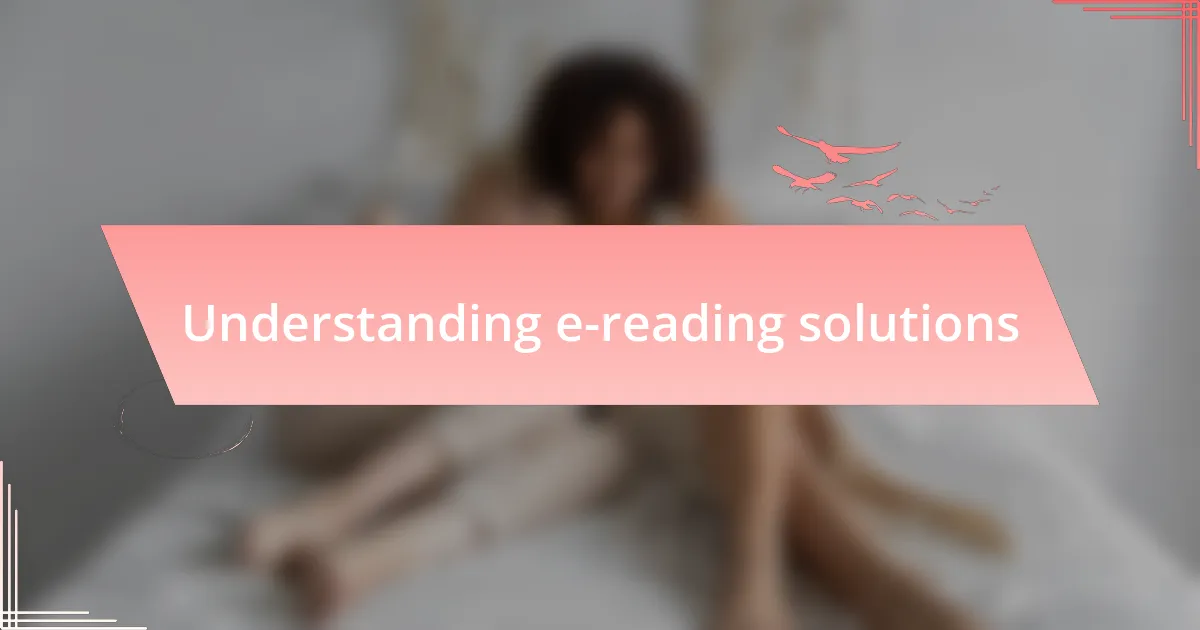
Understanding e-reading solutions
E-reading solutions represent a significant shift in how we interact with literature and information. I remember the first time I picked up a Kindle; it felt like unlocking a door to a whole new world of reading. It made me wonder, how many books can our lives actually hold? With e-readers, portability is a game-changer, allowing us to carry an entire library in our bags.
One of the most exciting aspects of e-reading solutions is their adaptability. For instance, I often tweak font sizes and background colors to reduce eye strain during long reading sessions. Have you ever wished you could customize your reading experience? This flexibility ensures that anyone, regardless of visual preferences or learning styles, can enjoy reading comfortably.
Furthermore, e-reading solutions often incorporate features that enhance comprehension and retention, such as built-in dictionaries and note-taking capacities. During my college days, I relied heavily on these tools for efficient studying, which made me more agile in grasping complex concepts. Have you experienced how digital tools can elevate your understanding? These features not only streamline the reading process but also encourage a more engaged reading experience.
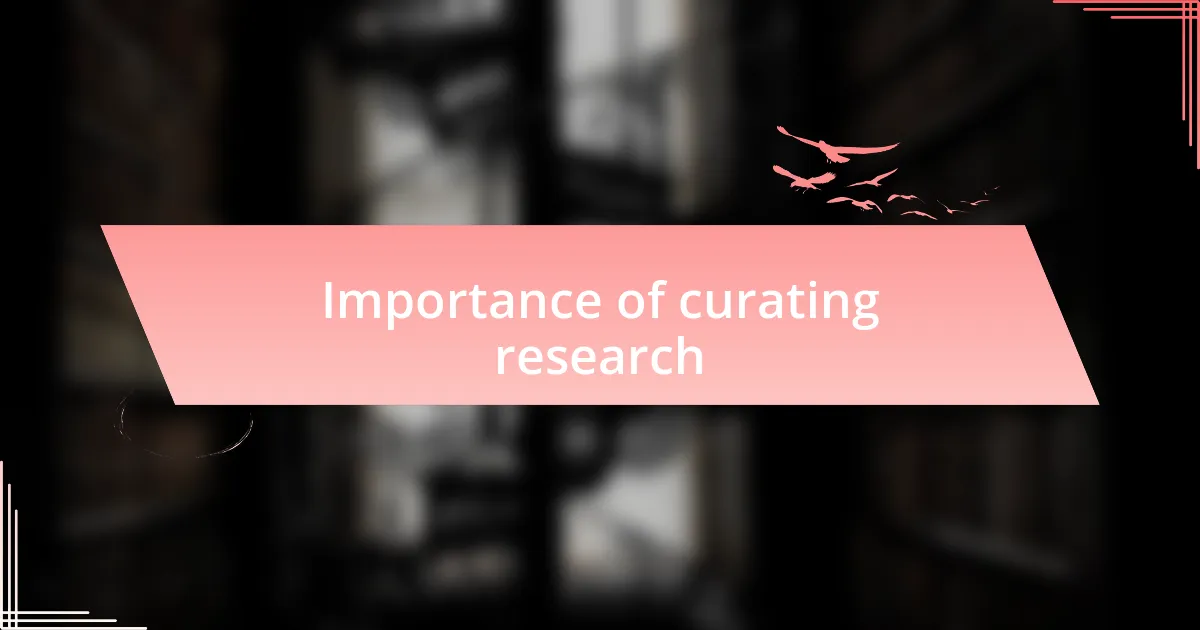
Importance of curating research
Curating research is essential because it distills vast amounts of information into manageable insights. I often find myself overwhelmed by the sheer volume of content available online. Have you ever felt lost in a sea of articles? By carefully selecting and organizing research resources, I can focus on what truly matters, leading to clearer understanding and better decision-making.
When I curate research, it feels like uncovering hidden gems that would otherwise go unnoticed. For example, I once stumbled upon a lesser-known study that completely changed my perspective on e-learning. The insights I gained were invaluable, making me appreciate the significance of thorough research curation. It’s like having a map in uncharted territory—without it, I would be wandering aimlessly.
Ultimately, curating research establishes a foundation for informed discussions and decisions. I’ve participated in many group projects where having well-curated resources sparked enlightening conversations and innovative ideas. Isn’t it amazing how the right information can transform a simple discussion into a brainstorming session filled with possibilities? This practice not only enriches the dialogue but also fosters a culture of knowledge-sharing and collaboration.
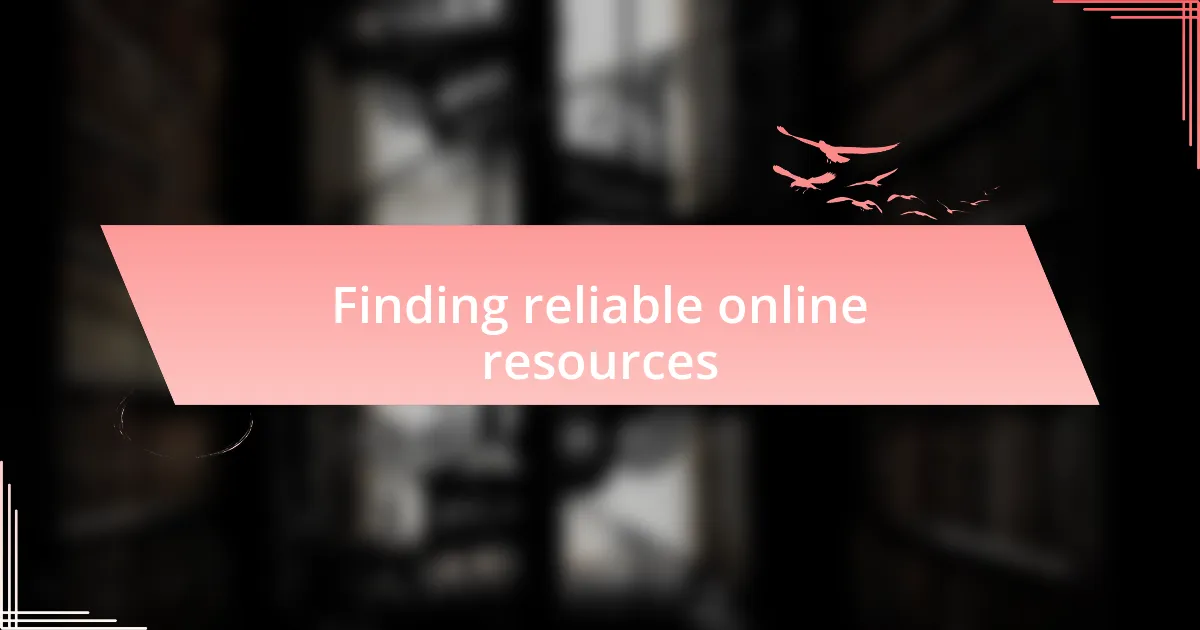
Finding reliable online resources
Finding reliable online resources can be a daunting task, but I’ve developed a few strategies that have served me well. When I begin my search, I prioritize established websites, academic journals, and reputable organizations. For instance, I often start with university websites or government databases, as they tend to be meticulously vetted. Doesn’t it feel reassuring to know that the sources you’re using have a solid foundation of credibility?
Another key aspect I look for is the author’s credentials. I remember once coming across a blog post filled with compelling information, but when I checked the author’s background, I realized they lacked relevant expertise. That was a wake-up call for me. I always ask myself: “Does this person have the qualifications or experience to discuss this topic?” Evaluating credibility helps me avoid falling into the trap of misinformation.
Lastly, I pay close attention to the citations within a resource. I find that high-quality materials often reference other reliable studies or publications. It’s like a treasure map leading to more valuable knowledge. For example, while researching a specific aspect of digital literacy, I traced several citations back to peer-reviewed articles. This not only reinforced the information I gathered but also expanded my understanding significantly. How do you ensure the resources you rely on are trustworthy?
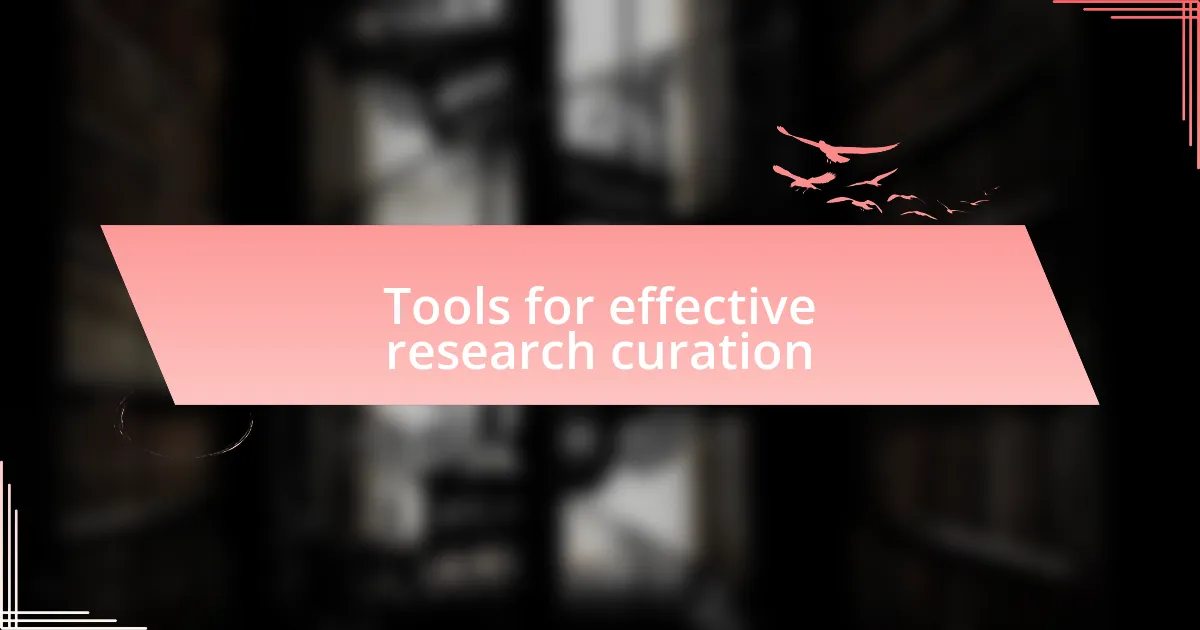
Tools for effective research curation
When it comes to effective research curation, tools like Zotero and Evernote have become my go-to resources. I remember vividly the first time I used Zotero; it felt like I had a personal assistant to manage my references! The ability to organize, save, and categorize sources streamlined my process significantly. I often wonder how I ever managed without it.
Another tool that has proved invaluable is Google Scholar. I appreciate how it simplifies the search for peer-reviewed articles. There was a time I struggled to find impactful studies for my work, but Google Scholar helped me discover gems I wouldn’t have found elsewhere. Have you ever felt lost in a sea of information? Using tools like this clarifies and directs my research efforts.
Lastly, platforms like Mendeley offer a unique social aspect to research. The first time I joined a group focused on educational technology, I was amazed by the collaborative spirit. Sharing insights and resources with fellow researchers not only enriched my understanding but also fostered connections. How vital is it to have a community backing your research journey? I find it’s essential, as the exchange of ideas can spark inspiration and new perspectives.
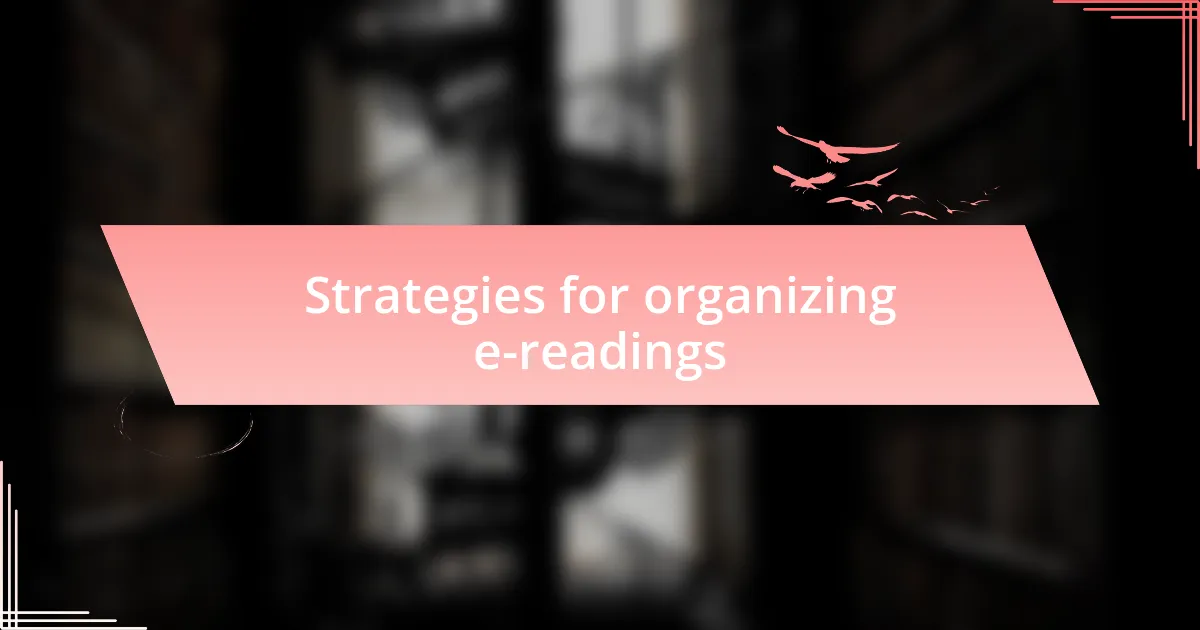
Strategies for organizing e-readings
One strategy I’ve found particularly effective for organizing e-readings is creating thematic folders. When I started categorizing my readings by topic rather than keeping everything in one place, it transformed how I approached my research. I recall diving into a folder dedicated to digital literacy and realizing how quickly I could locate pertinent studies, making my writing more streamlined and focused.
Another technique that has worked wonders for me is utilizing tags for my resources. By assigning specific keywords to each article, I can quickly sort and filter based on what I need at any given moment. I remember searching for something specific about e-books and, within seconds, I had all relevant material at my fingertips. It’s like having a tailored library that adapts to my evolving research questions.
I also recommend setting aside regular time to review and update your organization system. When I began dedicating even just 15 minutes each week to this practice, it felt refreshing. Have you ever found yourself overwhelmed by a growing pile of research? I certainly have, and maintaining an ongoing organization routine has significantly reduced that feeling, allowing me to approach my readings with clarity and purpose.
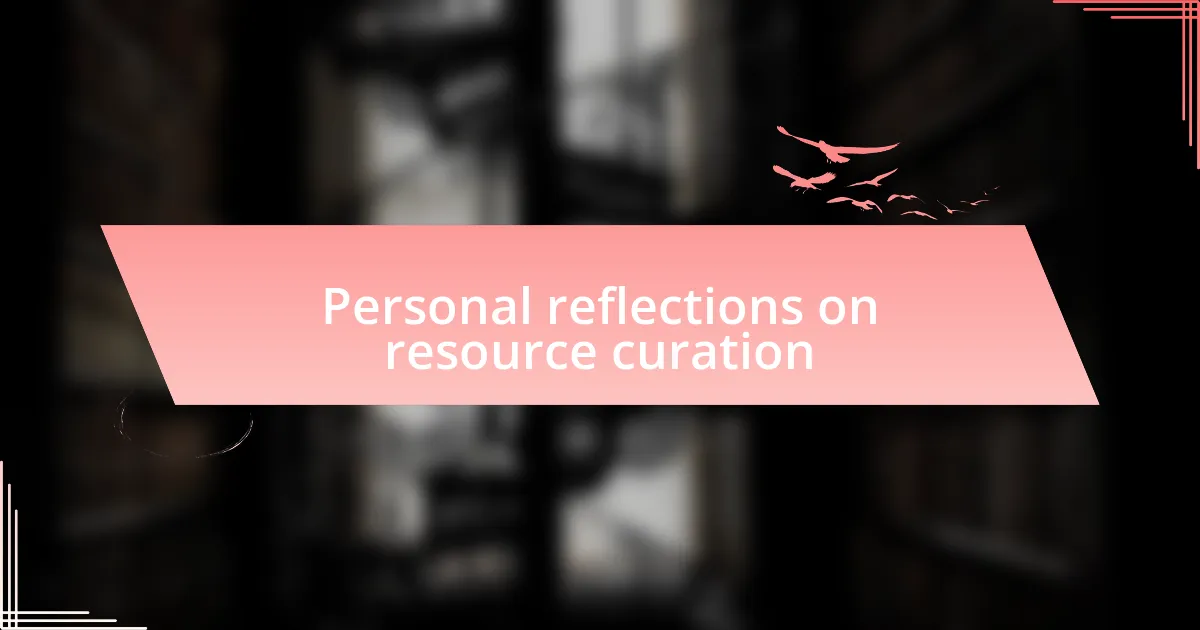
Personal reflections on resource curation
Curating research resources has been a journey of discovery for me. Early on, I grappled with the sheer volume of information available. I vividly remember a late-night session, surrounded by a maze of tabs and articles, feeling utterly lost. That experience pushed me to refine my approach, prompting me to focus on quality over quantity and to really assess the value each resource brought to my work.
As I’ve honed my curation skills, I’ve come to appreciate the emotional aspect as well. There’s a satisfying joy that comes from uncovering a gem of an article that perfectly complements my research question. It’s like stumbling upon a treasure while exploring vast seas of information. Have you ever had that thrill of finding something so relevant that it reignites your passion for the topic? It’s moments like those that remind us of the importance of thoughtful curation.
One of the most rewarding aspects of resource curation is sharing these treasures with others. Whether it’s through discussions with colleagues or sharing curated lists in an online forum, there’s a unique sense of community. I often reflect on how my own insights can help guide someone else’s journey. Isn’t it gratifying to know that your efforts can inspire others? This realization continues to motivate me to be more intentional with the resources I choose to curate.
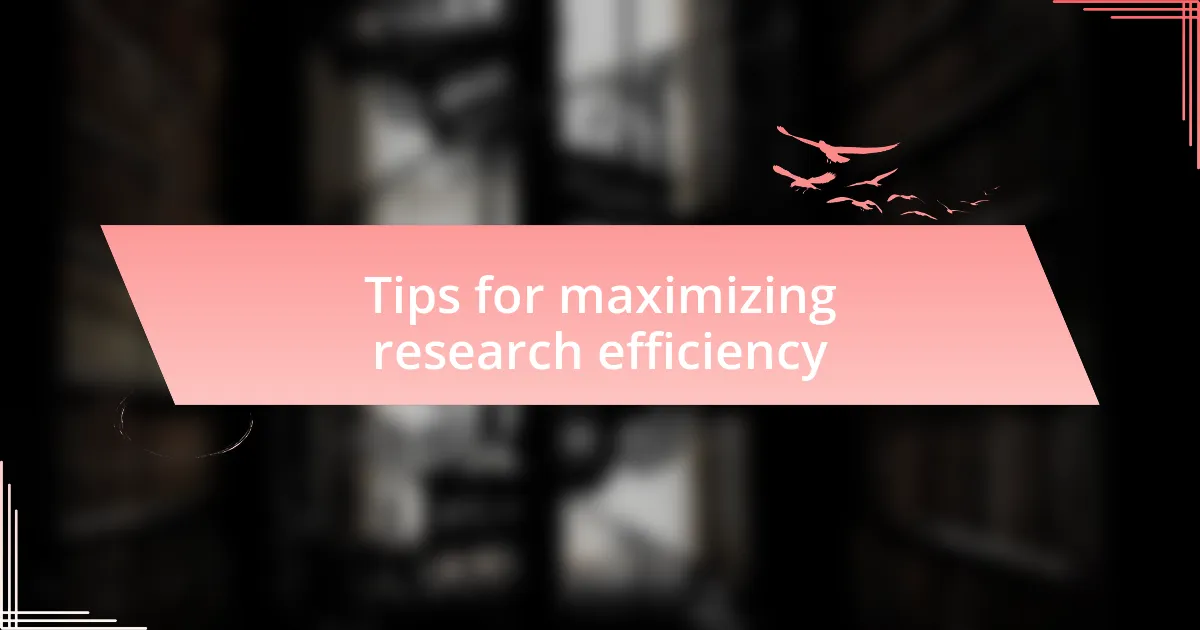
Tips for maximizing research efficiency
When it comes to maximizing research efficiency, I often find that setting clear objectives is a game changer. I recall a time when I dove into research with no specific goal in mind, only to emerge with a jumble of thoughts that felt disjointed. Now, I begin each research session by outlining my key questions. This process not only keeps me focused but also allows me to filter out irrelevant information. Have you ever wandered aimlessly in your research? Trust me, a clear intent can drastically change that experience.
Another strategy that has significantly improved my efficiency is utilizing digital tools for organizing resources. I’ve experimented with various tools like Evernote and Zotero, and I’ve found that having a centralized location for all my notes and references saves countless hours. The thrill of categorizing articles and tagging them makes retrieval a breeze later on. Do you use any tools? I believe that finding the right one for your style and workflow can transform the way you approach research altogether.
Lastly, I’ve learned the importance of taking breaks during research sessions. In the past, I would power through hours of reading, only to find my concentration waning. Now, I incorporate short breaks to recharge my mind. These pauses often lead to fresh insights or new ideas, making me fall back in love with the topic. How often do you take a step back? For me, it’s about fostering a balance—between deep engagement and allowing myself space to breathe and reflect.